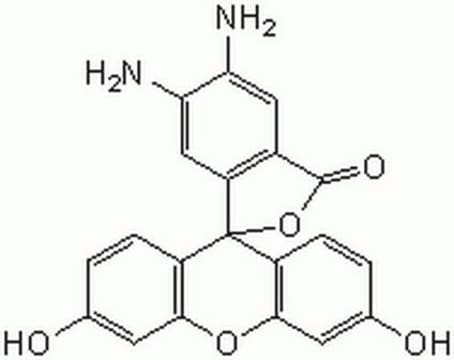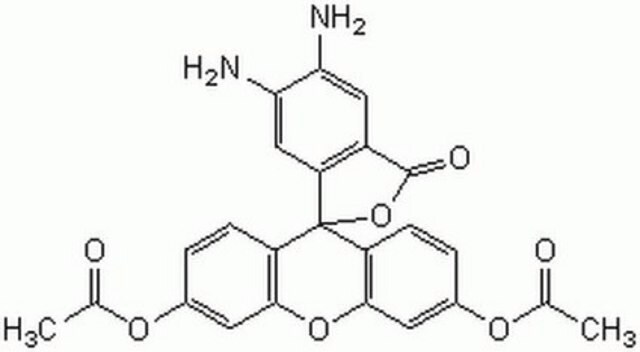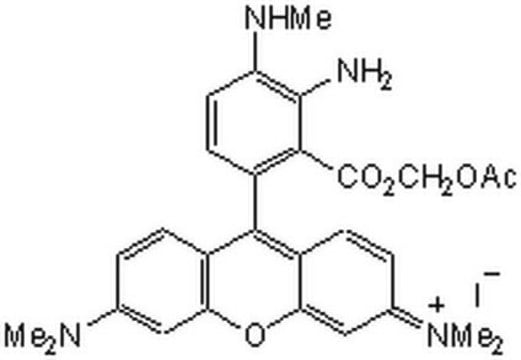D1821
DAF-FM
≥98% (HPLC)
Synonym(s):
4-Amino-5-methylamino-2′,7′-difluorescein, Diaminofluorescein-FM
Sign Into View Organizational & Contract Pricing
All Photos(1)
About This Item
Empirical Formula (Hill Notation):
C21H14F2N2O5
CAS Number:
Molecular Weight:
412.34
MDL number:
UNSPSC Code:
12352204
PubChem Substance ID:
NACRES:
NA.77
Recommended Products
Quality Level
Assay
≥98% (HPLC)
form
powder
storage condition
desiccated
color
white to brown
solubility
DMSO: >1 mg/mL
shipped in
wet ice
storage temp.
−20°C
SMILES string
CNc1ccc2c(c1N)C(=O)OC23c4cc(F)c(O)cc4Oc5cc(O)c(F)cc35
InChI
1S/C21H14F2N2O5/c1-25-13-3-2-8-18(19(13)24)20(28)30-21(8)9-4-11(22)14(26)6-16(9)29-17-7-15(27)12(23)5-10(17)21/h2-7,25-27H,24H2,1H3
InChI key
DIJCILWNOLHJCG-UHFFFAOYSA-N
Application
DAF-FM has been used in the visualization of nitric oxide (NO) in root sections of wheat seedlings. It has also been used to label neural crest (NC) cells.
Biochem/physiol Actions
DAF-FM is a highly sensitive, photo-stable fluorescent probe for the detection of nitric oxide (NO). DAF-2 is the original compound and is widely used, but DAF-FM is more sensitive to nitric oxide (NO) compared with DAF-2. DAF-FM is more photo-stable and less pH sensitive than DAF-2. DAF-FM is not quite as cell-permeable as the diacetate derivative, DAF-FM, but it does not need to be activated by cytosolic enzymes.
Caution
hygroscopic
Preparation Note
Color variation within the range from white to brown does not change performance.
Storage Class Code
11 - Combustible Solids
WGK
WGK 3
Flash Point(F)
Not applicable
Flash Point(C)
Not applicable
Choose from one of the most recent versions:
Already Own This Product?
Find documentation for the products that you have recently purchased in the Document Library.
Customers Also Viewed
Visualization of Nitric Oxide, Measurement of Nitrosothiols Content, Activity of NOS and NR in Wheat Seedlings
Adavi SB, et al.
Bio-protocol, 9(20) (2019)
Phillip Roder et al.
Scientific reports, 8(1), 5892-5892 (2018-04-14)
Local manipulation of complex tissues at the single-cell level is challenging and requires excellent sealing between the specimen and the micromanipulation device. Here, biological applications for a recently developed loading technique for a force- and pressure-controlled fluidic force microscope micropipette
Judy Choi et al.
Environmental health perspectives, 118(5), 589-595 (2010-05-05)
Silica nanoparticles (SiNPs) are being formulated for cellular imaging and for nonviral gene delivery in the central nervous system (CNS), but it is unclear what potential effects SiNPs can elicit once they enter the CNS. As the resident macrophages of
Kunal Bhattacharya et al.
Advanced healthcare materials, 7(6), e1700916-e1700916 (2018-01-16)
Polyethylene glycol (PEG)-modified carbon nanotubes have been successfully employed for intra-articular delivery in mice without systemic or local toxicity. However, the fate of the delivery system itself remains to be understood. In this study 2 kDa PEG-modified single-walled carbon nanotubes
Nobuo Ueda et al.
Scientific reports, 6, 37546-37546 (2016-11-23)
In many marine invertebrates, larval metamorphosis is induced by environmental cues that activate sensory receptors and signalling pathways. Nitric oxide (NO) is a gaseous signalling molecule that regulates metamorphosis in diverse bilaterians. In most cases NO inhibits or represses this
Our team of scientists has experience in all areas of research including Life Science, Material Science, Chemical Synthesis, Chromatography, Analytical and many others.
Contact Technical Service










